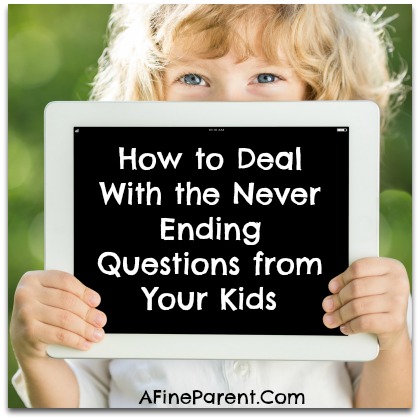 We all know that children are naturally inquisitive. We also know their inquiry sometimes manifests itself in annoying ways or at inopportune times, “Are we there yet?” or “Is that lady having a baby?” being among the most common examples.
We all know that children are naturally inquisitive. We also know their inquiry sometimes manifests itself in annoying ways or at inopportune times, “Are we there yet?” or “Is that lady having a baby?” being among the most common examples.
Our culture inundates us with examples of parents losing their cool with inquiring youngsters, from Al Bundy to Homer Simpson. In malls and grocery stores across the country, mothers and fathers are telling their little ones to stop asking, be quiet, or shut up.
In so doing though, they run the risk of stifling their children’s curious nature, which could hamper learning and close the door on possible futures at a very early age.
How to Respond to Questions You Can Answer
When our little (or not so little) ones ask us questions, we are presented with an opportunity to explain the world to them. Kneel down so you can be eye-to-eye and discuss dinosaurs or stars, or which bugs hide under rocks or why we have belly buttons, but the doll doesn’t. If you’re driving, turn down the radio (you’ll hear the song again) and address the question.
 This isn’t rocket science—you know answers to most of their questions. For example, when little Ava asks, “where does snow come from?” she presents you with an opportunity. You can simply ask what happens to water when it gets too cold. When she responds (or you lead her) to tell you it turns into ice, you can grab some of the snow and show her that snow is really just ice crystals. From there, you can help her discover that when it’s cold and rainy, tiny ice crystals fall because it’s too cold for water. We call these ice crystals “snow.”
This isn’t rocket science—you know answers to most of their questions. For example, when little Ava asks, “where does snow come from?” she presents you with an opportunity. You can simply ask what happens to water when it gets too cold. When she responds (or you lead her) to tell you it turns into ice, you can grab some of the snow and show her that snow is really just ice crystals. From there, you can help her discover that when it’s cold and rainy, tiny ice crystals fall because it’s too cold for water. We call these ice crystals “snow.”
After having the conversation, ask her questions about what you just discussed. These can be repeating the information you provided (“did you know that snow was really ice crystals?”) or can be an introduction of a tangential topic (“if ice is snow, why do they look different?”). Encourage your child to repeat some of the discussion or summarize it in her own words—this will help them remember the answers.
Remember, many things we take for granted are being seen for the first time by our children. When your son is six, or sixteen years old, he may encounter something he’s seen before, but this time he’s seeing it with his new big-boy/adolescent eyes for the first time. As our children’s brains grow and develop, so does their capacity for understanding. What they didn’t understand or weren’t interested in last year may fascinate them today.
What About When It Is Rocket Science? How to Address Questions You Can’t Answer.
When they ask a question you can’t answer, don’t be afraid to admit you don’t know. It’s a great lesson for children that adults don’t always know everything. They look up to adults as their primary sources of information about the world. Letting them be aware that adults don’t always know things will help them understand why it’s important to search for answers. They’ll see that adults are always learning too, and that when adults don’t know something, they use their tools to look it up, or they ask someone else for help.
The other learning opportunity is that you get to look up the answer together and bond over discovering something new! When you are driving with Jimmy and he asks why red means stop and green means go, you’ll realize you’ve never thought about that before and have no idea. Tell him you’re not sure.
Spend the few minutes before you get home asking him what he thinks the reason is. When you walk into the house, grab the tablet or head to the desktop and search with him. You’ll both learn that red has signaled danger for centuries, but originally, green was used for caution and white for go, which caused problems with train conductors (the first to use this system).
Understand That Sometimes, It Isn’t the Questions That Lead You to Discovery.
 There are many additional opportunities we can take to recognize and cultivate curiosity in our children. We need to remember that their questions aren’t always presented as questions. Children are naturally inquisitive; we, as parents, can recognize and build upon that.
There are many additional opportunities we can take to recognize and cultivate curiosity in our children. We need to remember that their questions aren’t always presented as questions. Children are naturally inquisitive; we, as parents, can recognize and build upon that.
“Wow, look at that flower!” can be your gateway into a discussion of flowers, colors, nature, beauty, a poem or story about flowers, the time you gave flowers to grandma, etc. Steer into categories where you feel comfortable—you should enjoy the conversation too!
I remember driving with my (then) four-year-old. I had my music on while he was paging through a book. I noticed some static or reverb in the music—right on the drumbeats. I turned off the music but the drumbeats (or more accurately, the tsh-tsh-tsh of the lightly tapped high hat) continued. This led to a conversation between me and my son about music, the kind of instrument that made that noise, whether he sounded like it, and what kinds of music we could hear it in. We explored different songs listening for different sounds. We both started hearing music differently that day.
Our daily interactions with our children are opportunities to encourage and embrace their inquisitive nature and help prepare them for the world in which they’ll one day make their way as teens and adults.
One word of caution—sometimes a question is just a question. Be prepared for your child to lose interest in what you’re saying because they get distracted, they are not in the mood to listen, or they aren’t all that interested in the nuts and bolts of the answer. Children are people, and just like us, they get bored or moody. That’s okay; you’ll get ‘em next time.
The 2-Minute Action Plan for Fine Parents
Our children’s questions, as inconvenient as they may be, provide us with opportunities to help our children understand the world around them and bond with us. Instead of ignoring the inquiries, take a moment to do the following:
- Provide age-appropriate detailed answers to questions for which you know the answer
- Admit to your children when you don’t know something, and use that as an opportunity to learn together
- Recognize this inquisitiveness doesn’t always manifest itself as a question, and the learning never stops—take moments to recognize your child’s interest in something and discuss it with them
The Ongoing Action Plan for Fine Parents
Begin by paying attention to what your children are asking. Actively listen and try to understand what is going on in their heads. After you have, answer their questions and ask follow-ups. You can encourage comprehension by having them repeat the answers and explain the answers in their own words. That’s it—simple.


Like me, you probably have an inquisitive toddler that loves asking questions. And as such are probably inundated with the infamous and unrelenting series of ‘why’ questions.
I used to get so frustrated and at times even mad because of these questions.
I was conflicted because I wanted to teach her, to help her understand and learn about the world around her yet the whys never seem to be satisfied.
It wasn’t until I read widely did I understand the reason for the whys.
The reason why your child asks why is because they want to connect with you.
Nice article. At early ages though, I found that the chain of questions and answers is never ending and may lead nowhere. An approach that worked beautifully for me was to ask the same question back to the kid. They usually open up, provide an answer to the question in their own way, or sufficient context to start a proper conversation on the topic.
My primary question-askers are 7 and 5; I’ve found that if I steer carefully, I can keep them from going nowhere more often than not. Maybe less so when they were younger… Regardless, asking them the question they asked forces them to self-reflect without realizing that’s what they’re doing. You’ll get an, “I don’t know” sometimes, but even that lets you dig deeper and get them to think. Very good point–thanks for reading and taking the time to respond!
An excellent article by a thoughtful dad. Another wonderful way to generate conversations that may lead to even more questions is to be the originator and ask them a question. When you do you honor them as knowing something and give them a chance to think about something new. From someplace I heard the following: A mom said to her three year old son, “Why do you keep asking Why?” from her son, “Because, that’s how I learn.”
I couldn’t agree more, Edie. That’s an important point–honoring your child by giving them the opportunity to showcase their knowledge. I love that. I think our children are more self-aware of their knowledge base than we tend to give them credit for. The quote at the end of your comment sort of supports that notion too. Thanks for commenting!